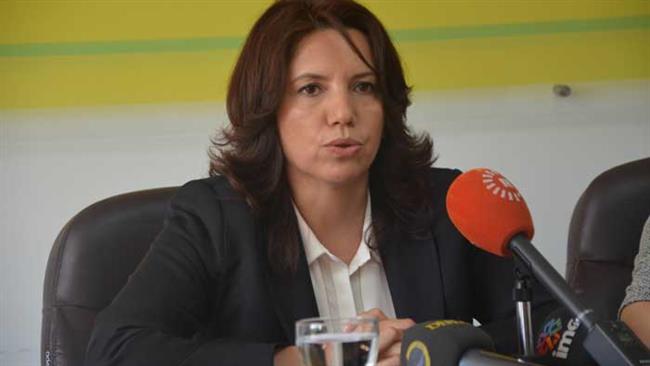Turkey probes pro-Kurdish party chief for criticizing Syria op, spreading terror propaganda
The new co-leader of Turkey’s Peoples' Democratic Party (HDP), the main pro-Kurdish party in the country, has come under investigation for speaking against Ankara’s offensive in Syria and making "terror" propaganda, just a day after she was elected to the post.
The state-run Anadolu news agency said Monday that prosecutors had opened a probe into Pervin Buldan’s speech during an HDP congress in Ankara on Sunday.
The report said Buldan was being investigated for possible violation of Turkey's sedition laws and for allegedly engaging in terror propaganda. The chief prosecutor in Ankara also accused Buldan of describing the operation against a Kurdish militant group in Syria as an attack on civilian Kurds.
During her address to party members and supporters before she was elected, Buldan said that the HDP would continue to oppose government policies in dealing with Kurds both inside Turkey and in neighboring Syria.
“We will not be a part or accomplice of this dark and lawless period in Turkey’s history,” she said in the angry speech that also touched upon Turkey’s tightening restrictions on the activity of the HDP, the second largest opposition group in the country.
Reports said authorities had sought to block the HDP congress as police stopped delegates’ cars and carried out frequent ID checks. Around 500 members and sympathizers had also been arrested in days leading up to the event, which was eventually held with the presence of some 32,000 people.
The congress elected Buldan, an Istanbul lawmaker, and Sezai Temelli, HDP deputy co-chairman, as the new leaders of the HDP to replace Selahattin Demirtas who has been in jail since November 2016 over charges of supporting terrorism. Demirtas had served as leader of the HDP since June 2014.
Gaps have widened between the HDP and the government over a years-long crackdown on Kurdish people living in the southeast of Turkey and also over a military operation inside Afrin against the Kurdish People's Protection Units (YPG).
The Ankara government justifies the crackdown, saying it battles those deemed close to the Kurdistan Workers' Party (PKK), an outlawed Kurdish militant group that has operated in Turkey and neighboring Iraq for decades.
Turkey regards the YPG as a terrorist group and an extension of the PKK.
Authorities have said they would prosecute those opposing or criticizing the Afrin incursion, and some 666 people have been detained so far.
American warplane downed after Yemeni attacks 'baffled' US air defense: Ansarullah
VIDEO | Yemenis praise the military for its successful operations against Israel
VIDEO | Israel continues to bomb Gaza homes
VIDEO | An insider's view of the country: Meybod City in Yazd
‘All wars have rules. All of those rules have been broken’ by Israel
VIDEO | Report flags India’s violation of rights of Rohingya detainees
Turkey's foreign minister meets Syria's de facto leader in Damascus
VIDEO | US Syria plots















 This makes it easy to access the Press TV website
This makes it easy to access the Press TV website